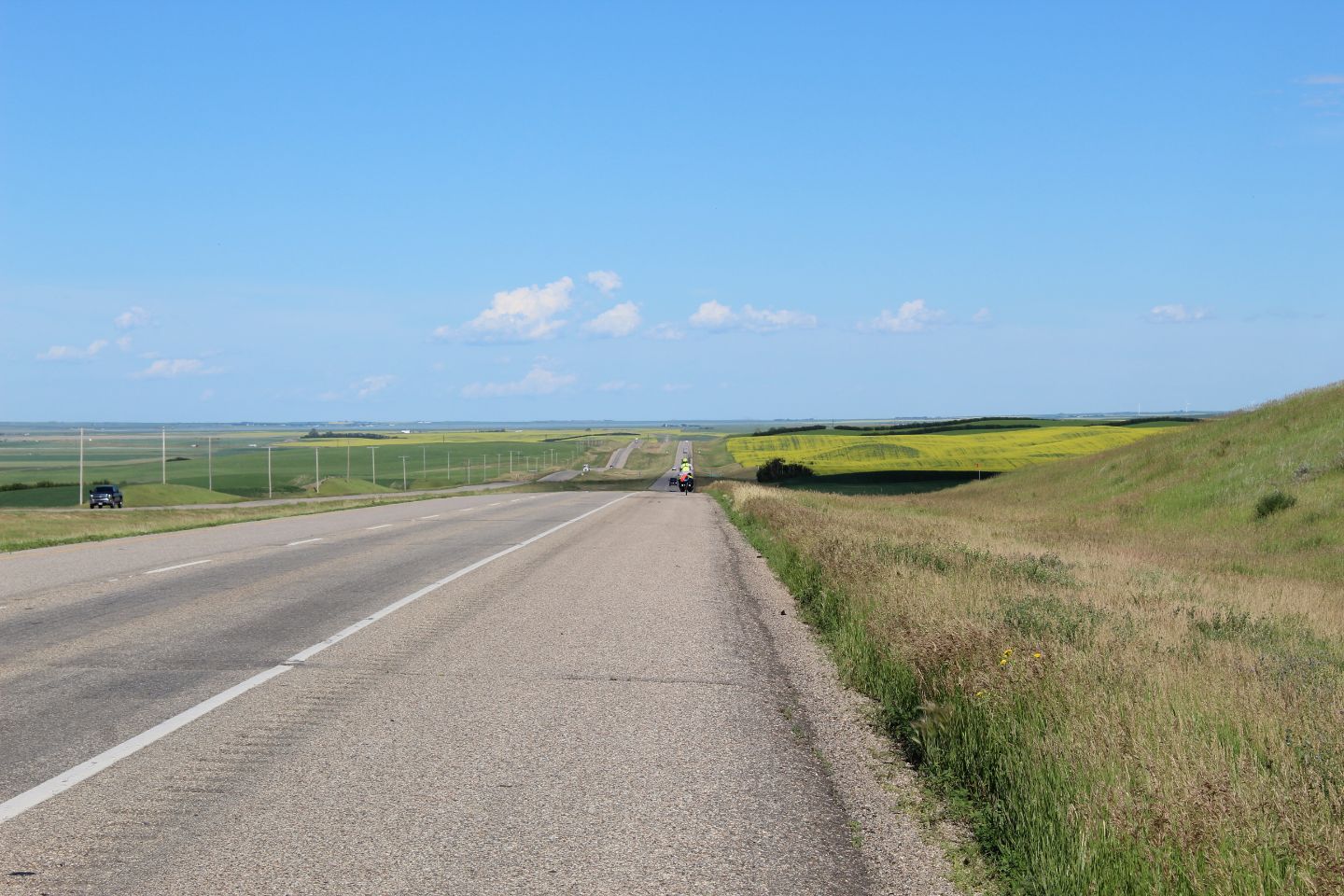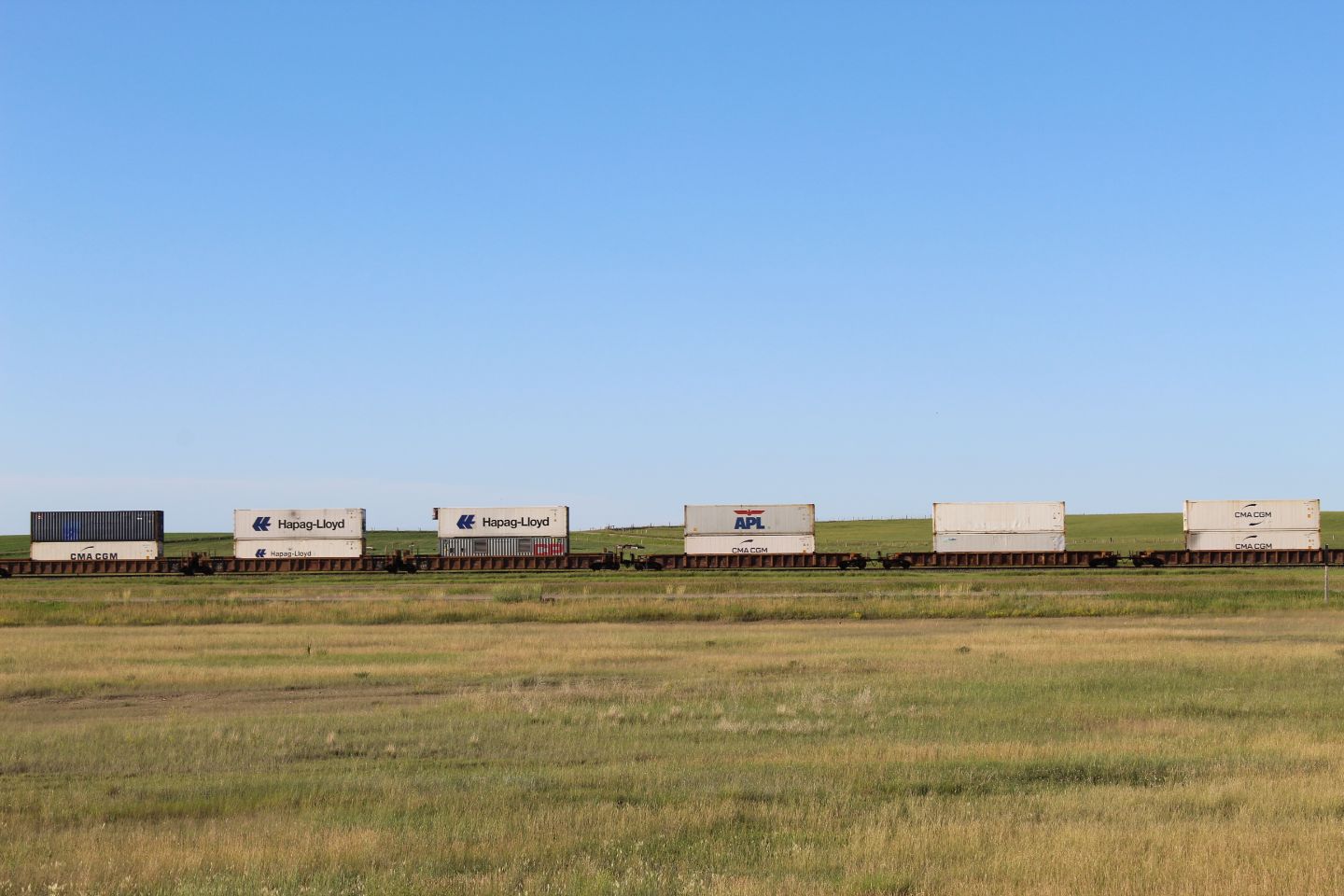-
Kini & Sara
-
🚲 Bike Jaunt 🚲
-
Gull Lake to Morse, 111km
Morse No. 165, Canada - Polarsteps
Some notes on prairie cycling:
-The landscape changes so little that what you remember at the end is mostly an overall impression of endless space and distance. There's a bit of a treadmill effect, like you've moved forward all day but stayed in one spot.
-The whole day depends on the wind; it can blow from the west and propel you 80km in a few hours with minimal effort. It can blow from the south or the east and you'll work hard for every kilometre and shred your knees and shoulders fighting against it. We've heard tales in campgrounds of other cyclists staying day after day waiting for the wind to change.
-To deal with the treadmill effect, we've both started putting in earbuds and listening to music while riding. The road is a straightaway with a wide shoulder and few exits; we still watch our mirrors but don't need our ears to navigate traffic under these conditions. Listening to something is sanity-preserving in a mostly unchanging landscape, and shifts the dominant soundscape away from the noise of passing transport trucks.
-For this brief moment, bear-free camping. We wear our cooking clothes to bed and stash food bags in the tent vestibules with wild abandon. This will change in Manitoba, and by Ontario we'll need to be on full bear alert again, but for now we're enjoying not having to worry about it.
-The trains are ever-present; the tracks follow the highway and we see them go by several times a day and hear them all night no matter where we camp.
-There are lots of territorial birds next to the road, mostly red-winged blackbirds and grackles; we get swooped constantly, but have yet to actually be attacked.
-The road is lined with beautiful plants including foxtails and these big purple starburst-shaped wildflowers. Wild roses and sunflowers sometimes, too.
-Ground squirrels/gophers everywhere: really good at reproducing, really terrible at staying alive. In the absence of kilometre markers on the road, the dead gophers are often eerily evenly spaced out. They appear in every possible configuration of missing and mangled body parts (sometimes you just look down and see a little hind leg lying on its own on the road), and in every stage of decay. I saw one run into the road just before a transport truck fully ran it over, and it passed between the wheels and continued its journey across the road. Live ones often scatter beside the road as we come up beside them. Sometimes fields are dotted with them and they come right up to our feet at rest stops. We regretably didn't make it to the gopher museum the day we drove to Drumheller, where they've been taxidermied, dressed in little clothes, and placed in an array of dioramas with humorous speech bubbles, but it's at the top of the list the next time we're back this way.
-Individual people we meet tend to be incredibly kind and lovely.
-And also, visible reminders of the culture. Jesus signs in fields. Anti-choice billboards. Churches churches churches. Freedom convoy stuff in the streets, on vehicles, at local businesses.
-Knowing, too, that we're only getting a narrow view of Saskatchewan along the Trans Canada. Given more time and drier conditions on some gravel side roads, we know there are forests to the north and the Cypress Hills and wild moonscapes to the south, and there are signs that point to First Nations off in both directions; there's a lot here that we don't see on this route.
---------------------------
We finished the day at a lookout tower by a saline lake full of migratory birds just outside of Morse. Katrina and Ryler back in Tompkins had turned us onto iOverlander, an app that community-sources information about paid and free places to sleep undisturbed for the night, and we'd looked at the map and seen that people had often parked their camper vans near the lookout on Reed Lake without issue. We arrived and cooked dinner on the little picnic table, and then set up in the field nearby at sunset-- our first time wild camping in full view, not trying to hide away.
We'd just gotten set up when an RCMP car pulled in; we were really sure we were about to be asked to leave, and sent to the too-expensive campground down the road, but the officer who pulled up had just been stopping to watch the storm that was slowly rolling in over the horizon. He warned us that there were major thunderstorms coming that night with high winds and golf ball-sized hailstones, suggested that we move under the lookout structure (maybe not the best idea in a thunderstorm, but the only way to keep our tent from being pulverized by the hail), offered to drive us somewhere if we wanted, and also to check up on us one more time before his shift ended at midnight.
We didn't take the ride, but did take the advice to move under the lookout, and we left the tent fly open and watched lightning dancing all across the horizon, so far away for a while that we couldn't hear the thunder.
The storm was brief but terrifying when it got to us; the wind picked up suddenly and was forcefully shaking the tent, lightning was flashing, and there was just the shattering sound of hailstones and thunder all around us. We hunkered down, huddled through it, and put all our hopes on the integrity of the wooden structure above us that was getting pelted and gusted at, as well as on the probability that, as the tallest thing for a few kilometres around, this wouldn't be the one night it turned into a lightning rod.
It moved on as quickly as it had come, but this was all in the middle of the night; we had a 5am alarm set in the morning, to clear out before anyone might show up to use the lookout, and we left feeling like a train wreck the next morning.
Wild camping in plain sight in small-town Saskatchewan: Successful, even obtained the blessing of local law enforcement.
Keeping on top of storm warnings and taking appropriate precautions: Utter failure, will try to do better next time.
-Sara











Country Guides:
Canada









